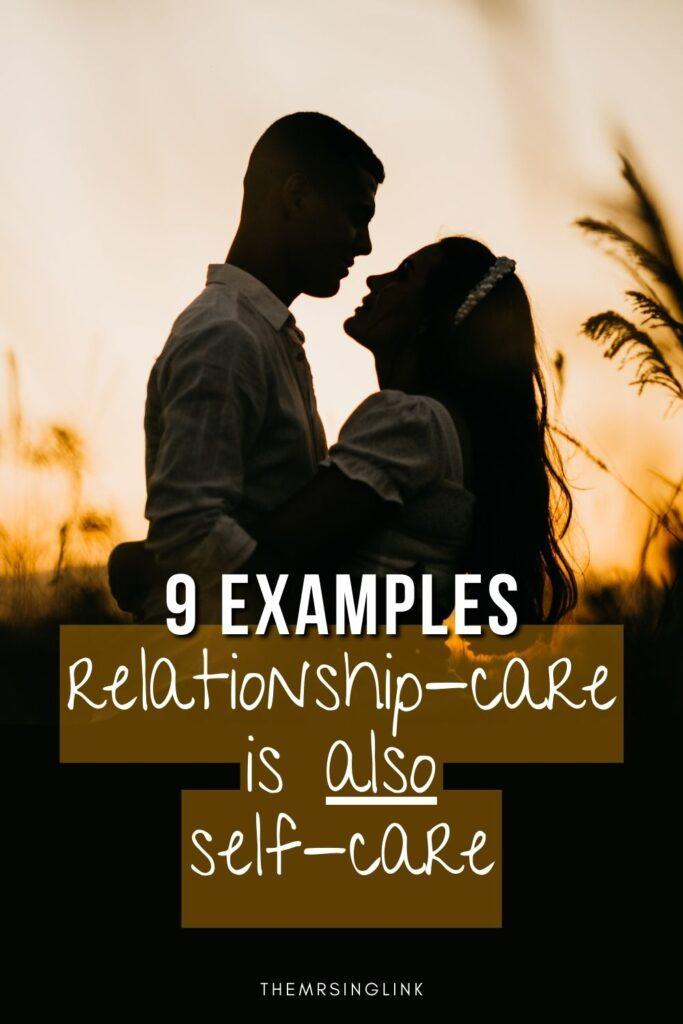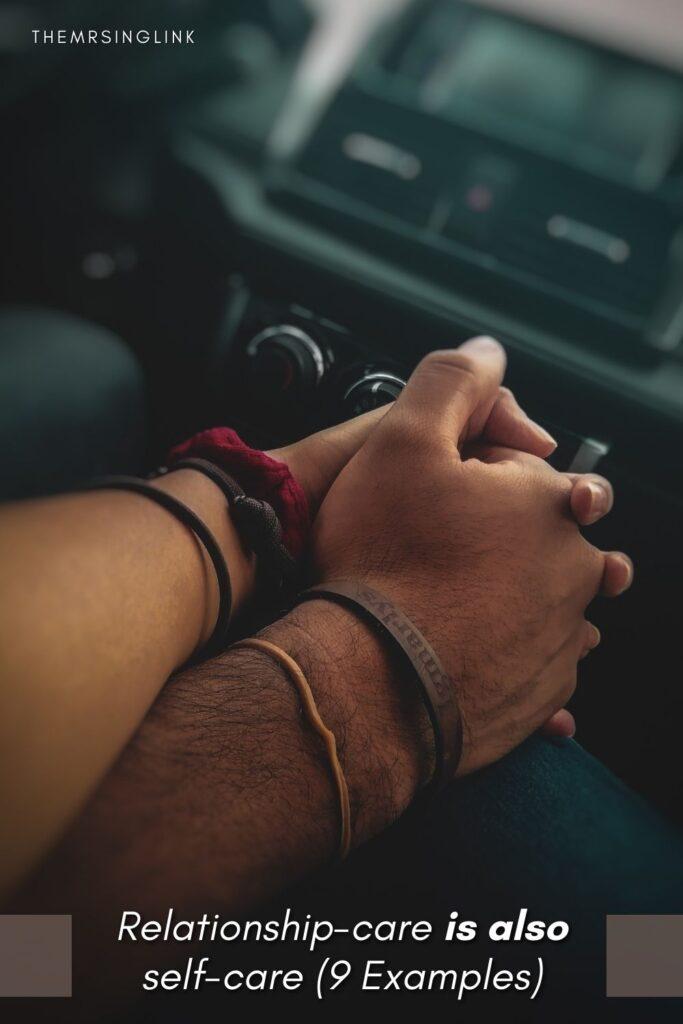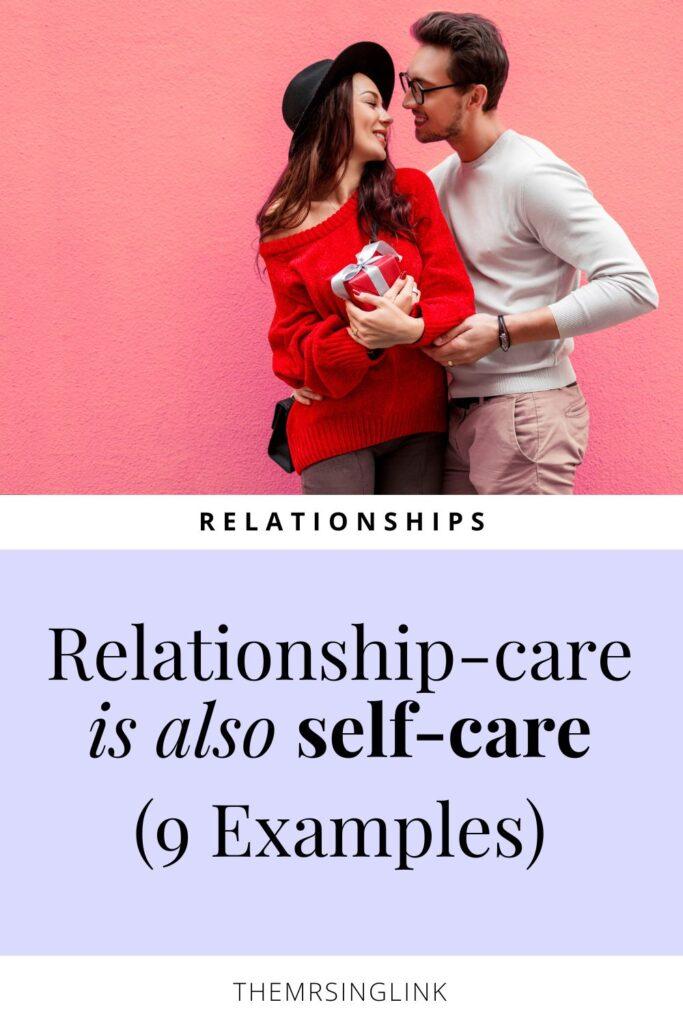I’m not afraid to admit it – as a married woman, relationship-care and self-care are congruently interconnected. Relationship-care is also self-care, yet why is this statement so combative? That’s a personal question to ask and unpack yourself. Putting effort into and towards my marriage ultimately makes me *feel good*, as it should! The same way working out is part of your self-care routine – it’s work and it’s effort, so you may not always feel inclined to doing it, but in the end it’s worth it.
Either way, the self-care we know pertains only to the self. At 19, I would have 1000% agreed, and even cheered for it. Now, at 30-something, I’m beginning to see the idea of self-care (and even the other extensions of self, like self-Love and self-help) through an entirely different lens. Oftentimes I find that self-care is narrowed down to desire and convenience. Like I mentioned above, working out or eating healthier is part of many people’s self-care regimen, yet it’s not always something desirable. Soooo….is self-care strictly about doing only the things we *want* to do? Orrrrr is it also based on self-accountability, self-responsibility, and self-control? Either way, basically, the self-care we know pertains only to the self.
Self-care, to me, is not just solely replenishing my own resources, or meeting my own personal [basic, necessary/functional, irrational, unattended, *selfish] needs, but caring for myself also implies serving the very things that mean something to me or that I may bear responsibility for, and therefore have effect in my life. *For instance, another aspect of my self-care is spending quality time with my precious doggos. I literally don’t feel like myself if I don’t have proper, allotted time with them – that’s besides them being my responsibility!
With that, relationship-care fills my “cup” as much as it does my marriage’s and my husband’s. Since relationship-care is also self-care, what does this look like and what is achieved, exactly?
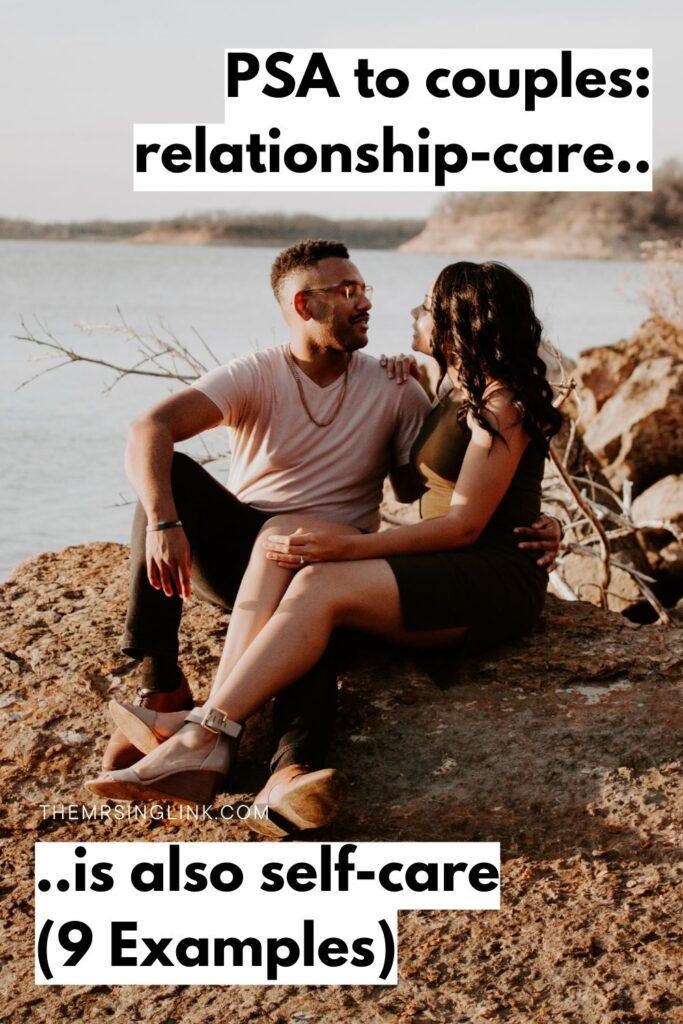
Relationship-care is also self-care [9 examples]
Quality time together
The same as alone time, “me time” or solitude as part of my self-care. Quality time with your partner, whether scheduled or spontaneous, is not only necessary but it’s a given. It’s one of those “duh” requirements in relationships that don’t, or shouldn’t take much thought. You’d be surprised, though. The main point, often missed, is in the word quality. These questions should be acknowledged and addressed as part of relationship-care.
How is your time together being spent? Are you setting aside quiet, intimate time to talk, and are you taking initiative to do something *fun* together?
What does it tend to look like? Are you actually enjoying one another’s company (like, for real-real) or are you just *tolerating* each other?
What are you achieving from it? Are you connecting (gaining that feeling of growth and closeness) or disconnecting (withdrawing or detaching due to set off triggers)?
Is your time together anticipated? Does it make you feel *full*, or is it to simply check off a box on your revolving To-Do’s?
Is your time together bringing joy to your life? Or does it too often feel like taking steps backward instead of forward?
Break up with unhealthy cycles
As part of self-care, we *break up* with unhealthy habits all the time – like junk food, binge-watching TV, or scrolling excessively on social media, for instance. The question remains as to whether breaking up with unhealthy habits are short-term or temporary, like a fast, and if this is a continuous cycle we simply endure. To *break up* with an unhealthy habit in self-care means to cut [all] ties to it – it will require conscious effort and energy, as well as practice [actionable change of both mind and body].
In the case of junk food, this practice looks like taking steps to avoid succumbing to or resorting to fast food, such as making a weekly meal plan ahead rather than figuring out what to eat or what to cook in the moment. This certainly doesn’t mean we won’t make mistakes, but we’re less likely to fall victim to a bad habit when we’re working proactively against it AND are more forgiving when we make mistakes along the way.
Now apply this same logic for relationship-care. Breaking up with unhealthy or oftentimes painful cycles, habits and patterns aren’t given as much consideration. They may be pointed out in the midst of an argument or when we feel triggered in the moment, but are detrimental issues to the relationship simply being called out in existence rather than being consciously eradicated?
For example, it bothers you that your partner spends way too much of his time on his phone when he’s with you or around you, because it feels like you’re being ignored and that your time together in each other’s presence is not respected or valued. You explain this to him, to which he [hopefully] agrees and complies (or maybe he’s only telling you what you want to hear). Either way, words are just words – they really mean nothing if not followed by action [change]. And maybe for a little while change is evident, but it isn’t long before the habit resurfaces and you’re having to readdress the issue like its the first time all over again.
Breaking up with unhealthy cycles requires two-way accountability. So in this example, he also has to be willing to *break up* with his unhealthy habit. It won’t mean he won’t slip up or make mistakes, but it’s the responsibility of both partner’s to be accountable and to hold one another accountable respectfully. This isn’t always easy, because breaking unhealthy cycles takes time and consistency – it’s not always the quit cold-turkey results we’re expecting.
Interrupt times of complacency
Self-care is often depicted as doing something *for you* that’s out of the ordinary, or escaping the norm. We’re all beings of complacency – complacency is peace, security, satisfaction, *comfort*, and contentment. Complacency, in the self-care realm, is often the scapegoat when I think we ought to not view it so harshly.
Can we become *too* complacent? Yes.
[pt_view id=”cb66511r8f”]
Complacency in relationships is seen as the evil twin sister, because it means boredom, aloofness, indifference, contempt, and even smugness. Are we willing to admit that complacency, as a result, can stir up some of these things in us? Therefore, obviously, we shouldn’t *wait* for complacency to take a negative toll on our relationships. Of course, we’re not perfect, yet we’re *creatures of habit*. So are we in the habit of complacency? Yes, because we all want to experience and maintain *peace*, especially in our relationships – it’s whether we have a habit of letting complacency become laziness.
Interrupting times of complacency doesn’t necessarily *require* the black and white scenario, “Hey, we’ve been in a rut lately and I’m noticing things have been boring with us, ” because who really desires to hear THAT? Instead, positive proactivity (like we would give ourselves in self-care) should be the main goal. We can do this by simply initiating something *new*, or by way of gently discussing ways to *switch things up*.
Relationship-care doesn’t play the blame or shame game. Partners with emotional maturity know to extend grace in times of complacency – again, because complacency isn’t all *bad*.
Check-in without basing on assumptions
Self-care means checking in with yourself because, well, you care. I surely don’t go on in my daily life assuming all is well, okay, and to carry on. At least, not anymore. When I feel *off*, I no longer ignore it or sweep it under the rug. I also don’t *push through it* if I don’t absolutely have to. The same goes for our relationship, or our partner in particular. Why do we go on assuming all is well day in and day out? Or the opposite – when something isn’t right, why do we tend to take it personally or make it about ourselves?
I’ll be the first to admit that I am terrified, and *hate* bringing up things I’m bothered by or annoyed about (pertaining to my marriage, my husband or not) because, oftentimes, I don’t feel its *safe* to do so. Therefore, some people are not as [willingly] open, expressive or vulnerable with confrontation, their feelings or concerns they have. Hence, I think, for the growing trend of couples being more proactive in taking time to check-in with their partner and the relationship. It can be much easier and seemingly more normal/*natural for some couples to schedule or set aside *agreed* time to check-in with one another because it voluntarily creates this *safe space*.
On the flip side, I’m prone to making assumptions about my partner since I am someone who tends to go through life *reading the room*. So it’s easier for me to avoid making assumptions by checking in with my husband more *organically*, or in the moment. If I *sense* my husband is annoyed, I’m more likely to ask, “I get the feeling you’re bothered – what’s wrong?” at that point in time. I’m more likely to come to irrational conclusions if I was to *wait* until our appointed check-in for him to tell me he’s been bothered by my hair building up on the shower drain.
Making an assumption means you have a predetermined answer or reasoning based on your feelings and perception of a situation. It’s like asking your partner a personal question only to answer for them. If you’re checking in with your partner based on assumptions it may sound like, “Lately you come home from work and you’re very short with me, so I don’t know why you’re upset with me when I haven’t done anything wrong.”
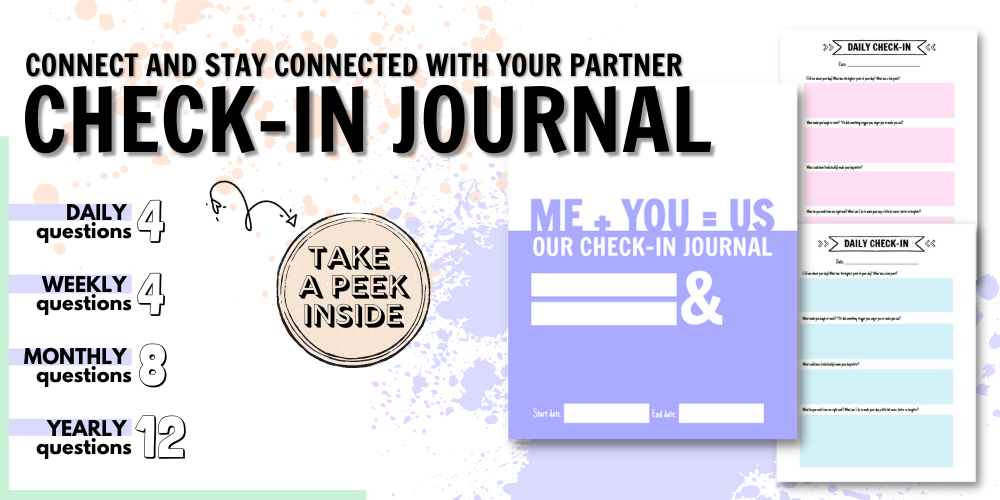
Know your weak spots, and how they “show up”
Self-care isn’t all glamorous, sunshine and rainbows – it’s knowing how to tame the beast inside you when it breaks free from its cage. But we don’t call the beast within us *weak spots*, nor do we consider our weaknesses barbaric. We’re more merciful than that, such as when we go no contact with a friend because *we know how [aggressive, hyper-sensitive, haughty] we can get* when they say or do something that triggers us.
We all have weak spots. Some examples pertain to distrust, insecurity, intimacy, jealousy, control, lust, deception, abandonment, rejection, emotional immaturity, and negative self-image. Relationships in and of themselves are going to bring out and show you those weak spots, one way or the other whether you want them to or not. In relationship-care, it’s your responsibility to get to know them, to try to understand them and to regulate them.
For example, you’re not as expressive or open emotionally as your partner. This can feel like your partner often backs you into a corner, which triggers you to shut down and ultimately push your partner away (responding with a harsh, cold tone and rigid, restricting boundaries). By managing your response pattern, instead of shutting down you let your partner know that you’re feeling overwhelmed and need some space [to think, to process]…*before you’re ready to continue the conversation.
Know when and how to respond to your partner’s weak spots
Referencing the above, your partner will also have weak spots. As part of relationship-care there’s also an empathetic willingness to learn and understand your partner’s weak spots, as well as to know what triggers them and how to respond to them.
For example, if your partner retreats from emotional intimacy, a common trigger for this is when they feel chased, forced or guilted into opening up. They may shut down or withdraw from affection and demand space; the more you press the more they resist. For your partner to feel more secure and to share their desire for closeness, it’s important to tailor the love they need in a way that isn’t intrusive, demanding or overwhelming.
Basically, relationship-care is having an understanding that your partner doesn’t readily/easily open up, so instead of prying for their feelings you engage with them by watching their favorite show because it shows them, “Hey, I want to be close to you,” thus creating a safe environment for them to feel more secure in opening up their feelings.
Be intentional of trust and respect through common courtesy
Self-care has regard for, IMO, certain common courtesies that contribute toward self-trust; for instance, you turn down a friend who wants to make plans because you already have it set in your heart to take some time to yourself to decompress. And by honoring that – the common courtesy of listening to your body and prioritizing what it needs, you’re establishing self-trust. Many of us, in that given situation, have been conditioned to reject what our body is trying to tell us, either because A. we should prioritize the needs of others over our own, or B. we think we’re doing what’s best for ourselves through what we *want* and not what we *need*.
First, to be intentional means having a focus or purpose; a decision with intention is by your own will – it’s deliberate and voluntary. Common courtesies, in our little big world, are like saying “Please” and “Thank you” – they’re small but with big impact. IMO, common courtesies are the little things we do (because it’s the right thing to do) out of consideration and respect for another, that may have little to no self-benefit.
And relationship-care, particularly your partner, is no exception when comes to the little things that can have the biggest impact on trust and respect. What do intentional common courtesies look like as it pertains to relationship-care? It’s really, really simple, and some of these may be rather controversial but they need to be said.
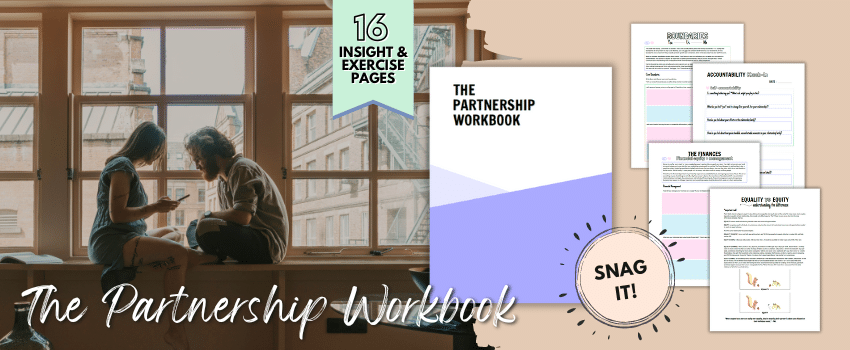
It’s giving your partner a heads up that you’re going to be running late from work. The consideration here is for your partner’s time, for instance, say if your partner is preparing dinner.
It’s turning down an invitation to lunch, one on one, with an attractive co-worker. Remember, some of the most impactful, intentional acts of trust and respect are often the ones unseen. Common courtesies are to be applied regardless if your partner has knowledge of it or not; again, because it’s about doing the right thing when there’s zero benefit in it for you.
It’s letting your partner know that some friends are making plans to get together, and to inquire about conflicting plans you both may have *before* making a commitment. No, this is not controlling, it’s courtesy and respect. A partner who values the same won’t control where and how your time is spent, but there’s an immense level of trust in knowing you each respect one another’s time, as well as the responsibilities and commitments of the relationship.
“Hey, babe, the girls want to get together this Friday and I wanted to check-in with you regarding any plans or what the weekend looks like for us?” versus, “Hey, babe, I’m going out with the girls Friday – K? Cool.“
Are we perfect at this? Obviously, no, and there’s nothing necessarily *wrong* with the second option. Regardless, we should strive for courtesy and respect through the first.
Show up voluntarily
Self-care is, in and of itself, simply *showing up* for ourselves, voluntarily. BUT, it’s not always easy. Sometimes it involves doing the things we don’t necessarily *want* to do, like going to the gym every day or skipping a party weekend to catch up on much needed sleep. But we *usually*, or should feel better after, right? Like, at our core, in our soul.
Showing up voluntarily in your relationship, as relationship-care, is a vital necessity. There’s no tip-toeing around it, because relationships are about two people coming together to make a partnership work, and it won’t only/always involve the things we *desire*. We could look at this from both greater and lesser extremes, but the majority of showing up involves the lesser, and if couples are showing up voluntarily for the lesser extremes then they are most likely to the greater extremes. Showing up voluntarily may be as simple as tending to your partner when they are sick – bringing them medicine or food, taking them to their doctor’s appointments, and simply checking up on how they feel and what they need.
Of course there requires some fine tuning the balance of showing up within our capacity, but that doesn’t mean not showing up at all. It may mean showing up in the best way you can. For example, you may not be able to get off work to make it to your partner’s unexpected/last minute promotional ceremony (that’s not within your capacity), but showing up may involve taking them to a nice dinner later to celebrate.
[mailerlite_form form_id=23]Address and tackle concerns as a team, always
An aspect of self-care that tends to be under the radar is self-discipline, accountability and responsibility (for your choices, words and actions) or when problems arise. I don’t know about you, but poor self-care is allowing your trials to consume you by consistently burying or feeding into them. Unforgiveness, self-destructive behaviors, and playing the *victim blame-game* is also not self-care. These can be pretty tough pills to swallow when *true* self-care is lacking.
In relationships, you address and tackle your struggles, concerns, disagreements, and trials as a team – always! Relationship-care is the practice of closeness even when problems arise, otherwise if you treat your partner as the enemy…then who are you committed to? Them, or the problem?
Emotional maturity is not necessarily the perfect ableness to fix [all] your relationship problems, it’s the awareness and willingness to *see* your relationship as a separate entity from the problem(s). Yes, this requires the practice of discipline, accountability and responsibility in relationship-care.
